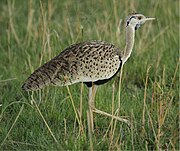
Bustards, including floricans and korhaans, are large, terrestrial birds living mainly in dry grassland areas and in steppe regions. They range in length from 40 to 150 cm. They make up the family Otididae.
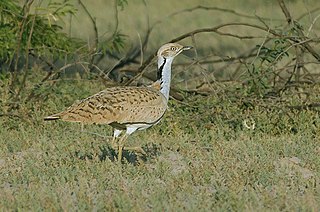
Chlamydotis is a genus of large birds in the bustard family. The genus name is from Ancient Greek khlamus, a horseman's cloak with weights sewn into the corners, and otis, bustard.

The great Indian bustard or Indian bustard is a bustard occurring on the Indian subcontinent. It is a large bird with a horizontal body and long bare legs, and is among the heaviest of the flying birds. Once common on the dry grasslands and shrubland in India, as few as 150 individuals were estimated to survive as of 2018, reduced from an estimated 250 individuals in 2011. It is critically endangered due to hunting and habitat loss. It is protected under the Indian Wild Life (Protection) Act, 1972.

Denham's bustard, Stanley bustard or Stanley's bustard is a large bird in the bustard family. It breeds in much of Sub-Saharan Africa. It is a species of open ground, including agricultural land, grassland, flood-plains and burnt fynbos. It is resident, but some inland populations move to lower altitudes in winter. The common names for this species refer to the English explorer, Major Dixon Denham, and the English naturalist Edward Smith-Stanley, 13th Earl of Derby.
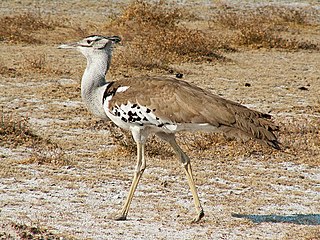
Ardeotis is a genus of birds in the family Otididae.

The southern black korhaan, also known as the black bustard, is a species of bird in the bustard family, Otididae. This small bustard is found in southwestern South Africa, from Namaqualand, south to Cape Town and east to Makhanda. It prefers semi-arid habitats such as grasslands, shrublands and savannas where it can easily prey on ground-dwelling arthropods and eat seeds. It reproduces yearly in the spring and will lay about one or two eggs per breeding season.
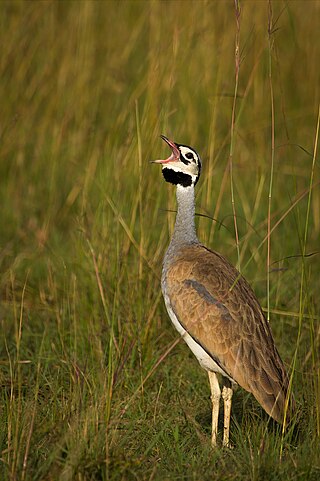
Eupodotis is a genus of bird in the bustard family Otididae. It contains two species, all restricted to Africa. Species in the genera Afrotis and Lophotis are sometimes included in this genus; however some authorities separate the Karoo korhaan, Rüpell's Korhaan and little brown bustard as a separate genus Heterotetrax.

The northern black korhaan, also known as the white-quilled bustard, is a species of bird in the bustard family, Otididae. It is widely distributed across Southern Africa. Its habitat is primarily open grassland and scrub.

The blue korhaan or blue bustard is a species of bird in the family Otididae which is native to South Africa. Its call is a series of frog-like croaks, usually uttered in flight. Its natural habitat is plateau grassland, dry shrubland, arable land and pastureland. Its preferred habitat is one with short grassland and flat topography.

The buff-crested bustard is a medium-sized bird of East Africa; Somalia, Ethiopia, Kenya belonging to the family Otididae. The populations are stable and the species is of least concern.
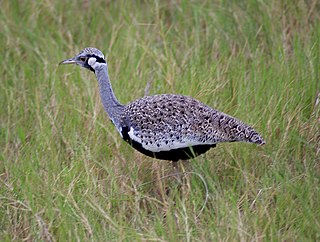
Hartlaub's bustard is a species of bird in the family Otididae. It is a medium-sized bustard with a long, think neck, and long legs. It is found in open, tall grassland, range from 1600 meters to 2000 meters in Ethiopia, Kenya, Somalia, Sudan, Tanzania, and Uganda.

The black-bellied bustard, also known as the black-bellied korhaan, is an African ground-dwelling bird in the bustard family.

Rüppell's korhaan, also known as Rüppell's bustard, is a species of bird in the family Otididae. The species is represented by a small bustard, only 60 cm long. The head and neck are grey, with black stripes down the throat, through the eye, and on the sides of the neck, and white cheeks. The body is sandy brown above, and white below. The legs are sandy yellow-brown. Rüppell's korhaan received its name to recognize Wilhelm Rüppell, a German explorer, collector and naturalist. It is native to southwestern Africa in Angola and Namibia, according to Collar, N. J. - "The bustards and their conservation." Bustard in Decline, Jaipur (1982): 244–255. It is one of 13 native bird species found in the western part of Namibia. Normally they inhabit areas with low rainfall such as deserts, plains, and savannahs, where their exceptionally well developed senses play a major role in their survival and safety. They are most likely to be found in the Namibrand Nature Reserve, at Mirabib and Ganab in the Namib-Naukluft Park, at Bloedkoppie, and in the Spitzkoppe surroundings.
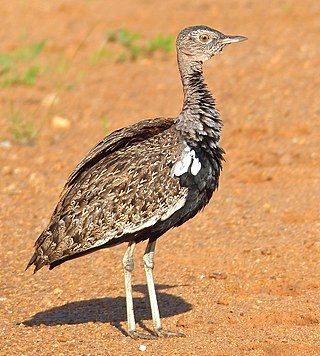
The red-crested korhaan or red-crested bustard is a species of bird in the family Otididae. It is found in Angola, Botswana, Eswatini, Mozambique, Namibia, South Africa, Zambia, and Zimbabwe.

Savile's bustard is a species of bird in the family Otididae. Otididae are an Old-World and understudied family of birds mostly found in Afro-Tropical regions. It is found in Burkina Faso, Cameroon, Chad, Ivory Coast, Gambia, Mali, Mauritania, Niger, Nigeria, Senegal, and Sudan.

The white-bellied bustard or white-bellied korhaan is an African species of bustard. It is widespread in sub-Saharan Africa in grassland and open woodland habitats. Despite its wide distribution and easily identifiable characteristics, very few studies have been conducted on this species and little is known about its life history and behavior.
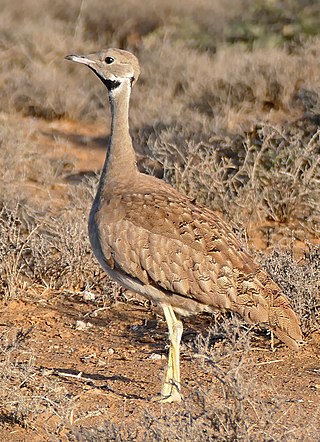
The karoo korhaan, also known as karoo bustard, is a species of bird in the bustard family, Otididae, from Southern Africa. There are two subspecies, the nominate race, from south-eastern South Africa, and H. v. namaqua, from north-western South Africa and southern Namibia.
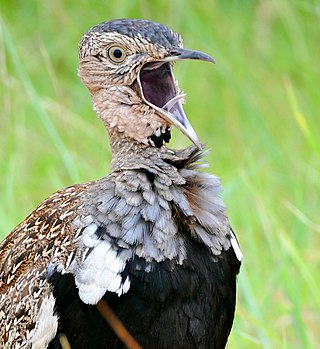
Lophotis is a genus of bustard in the family Otididae. The genus contains three species, all found in Africa. All three species are sometimes placed in the genus Eupodotis, and are closely related to that genus and the genus Afrotis. One distinctive feature of the genus is a pink retractile crest.

Afrotis is a genus of bustard in the family Otididae. The genus is endemic to southern Africa, and contains two species. It is sometimes included in the genus Eupodotis.

